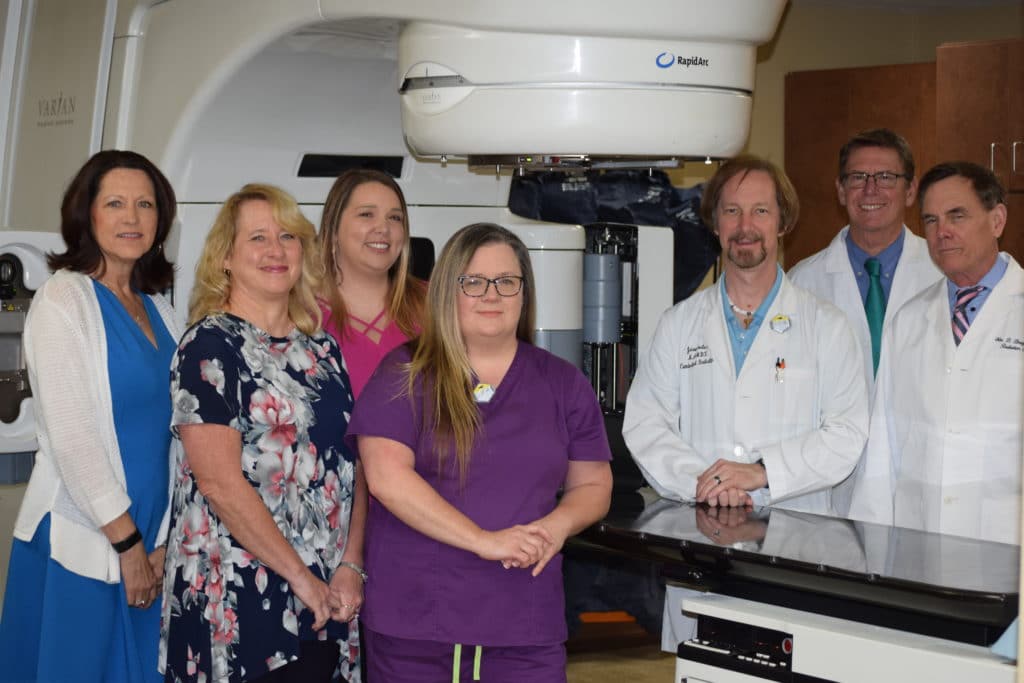Treatment & Diagnosis
Few words can be as devastating as "you have cancer."
Our highly trained, and caring staff have vast experience and a highly evolved understanding of cancer treatment with radiation.
Breast Cancer
Many breast cancer patients come to Cumberland Radiation Associates with advanced stage disease. Others have previously received traditional radiation treatments and cannot tolerate more radiation exposure. Our leading-edge technologies make it possible for our doctors to re-treat previously treated areas that have a recurrence of cancer.
When a breast tumor is large or not easily removed by surgery, radiation therapy before surgery can help to shrink the breast tumor. After breast-sparing surgery, radiation treatments can help destroy any remaining breast cancer cells.
Lung Cancer
We target lung tumors with some of the most advanced treatments and technology available. Dr. Bradford and his team experts will answer your questions and recommend treatment options based on your unique diagnosis and needs.
Symptoms of Lung Cancer
- A cough that does not go away or gets worse
- Coughing up blood or rust-colored sputum (spit or phlegm)
- Chest pain that is often worse with deep breathing, coughing, or laughing hoarseness
- Weight loss and loss of appetite
- Shortness of breath
- Feeling weak and tired
- Infections such as bronchitis and pneumonia that don’t go away or keep coming back
- New onset of wheezing
Bladder Cancer
Bladder cancer starts when cells that make up the urinary bladder start to grow out of control. As more cancer cells develop, they can form a tumor and, with time, spread to other parts of the body. (To learn more about how cancers start and spread, see What Is Cancer?)
The bladder is a hollow organ in the lower pelvis. It has flexible, muscular walls that can stretch to hold urine and squeeze to send it out of the body. The bladder’s main job is to store urine. Urine is liquid waste made by the 2 kidneys and then carried to the bladder through 2 tubes called ureters. When you urinate, the muscles in the bladder contract, and urine is forced out of the bladder through a tube called the urethra.
Prostate Cancer
Prostate cancer begins when cells in the prostate gland start to grow out of control. The prostate is a gland found only in males. It makes some of the fluid that is part of semen.
The prostate is below the bladder (the hollow organ where urine is stored) and in front of the rectum (the last part of the intestines). Just behind the prostate are glands called seminal vesicles that make most of the fluid for semen. The urethra, which is the tube that carries urine and semen out of the body through the penis, goes through the center of the prostate.
color illustration showing the prostate and surrounding area (including the location of the urethra, penis, scrotum, rectum, bladder and seminal vesicle)
The size of the prostate can change as a man ages. In younger men, it is about the size of a walnut, but it can be much larger in older men.
Renal Cell carcinoma
Renal cell cancer (also called kidney cancer or renal cell adenocarcinoma) is a disease in which malignant (cancer) cells are found in the lining of tubules (very small tubes) in the kidney. There are 2 kidneys, one on each side of the backbone, above the waist. Tiny tubules in the kidneys filter and clean the blood. They take out waste products and make urine. The urine passes from each kidney through a long tube called a ureter into the bladder. The bladder holds the urine until it passes through the urethra and leaves the body.

